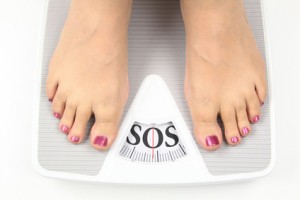
David Crestman is a big guy. At 6 feet 5 inches and more than 350 pounds, the former high school football player has trouble making it up and down the flight of stairs of his San Diego apartment.
“The cartilage in my right knee is almost gone,” the 29-year-old said. “Like, it used to be there, but it feels like the only thing between the bones is a paper-plate.”
Clinically, Cresman is morbidly obese. The extra weight, along with years of playing football when he was younger, has led to his knee problems. Even though he’s relatively young, Crestman rarely goes out because of the pain.
“I only drive to work and back, and sometimes over to the store,” he said.
Like many other morbidly obese drivers, Crestman doesn’t wear a seat belt on those short jaunts.
“I’d like to watch you get a seat belt around this,” Crestman joked, as he patted his stomach.
According to research at the University of Buffalo, obese drivers like Crestman are much less likely to buckle up. Drivers with a normal body weight were 67 percent more likely to wear their seatbelt. The study’s lead researcher, Dietrich Jehle, hypothesized that “obese drivers may find it more difficult to buckle up a standard seat belt.”
His study also showed that the relationship between obesity and seat belt use was linear. “The more obese the driver, the less likely that seat belts were used,” Jehle said in a statement.
According to the National Highway Traffic Safety Administration, seat belts reduce the risk of injuries by 50%, meaning Crestman is twice as likely to get injured if he’s in an accident because he’s not wearing his seatbelt.
There are only a few studies examining whether there is a link between obesity and increased injury and/or death rates. While there are not enough studies to make a broad determination, the few studies that exist suggest obese people are more likely to die or be seriously injured in an accident than their fitter counterparts.
One of the most cited studies comes from Dr. Thomas Rice at the University of California, Berkeley. Rice’s research mirrored the University of Buffalo’s seatbelt research, finding a linear increase in traffic injuries as weight increased. The more obese the driver was, the more likely they were to be injured or killed.
“Education is needed,” Rice wrote, “to improve seat belt use among obese people, as is research to understand the potential role of comorbidities [disorders] in injury outcomes.”
The possibility that other disorders related to obesity contribtue to the likelihood of injury makes it difficult to pin the outcome solely on lack of seat belt use. Online Auto Insurance could not locate any research related to obesity-related disorders and how they might affect car-accident outcomes.
According to senior research engineer for the Insurance Institute of Highway Safety Chris Sherwood, it’s a difficult issue to study, in part because crash test dummies currently aren’t built to represent obese people. Without those dummies, research is harder to conduct about what happens to a larger body in a crash.
“There’s not enough research yet to have real solid answers,” Sherwood adds.
Yet, Sherwood said he has seen other studies regarding seat belts and obese drivers. One in particular shows when drivers do wear seatbelts, it can lead to equipment failure as the belts are stretched-out.
“It increases the amount of slack in the system, allowing the driver to move farther forward during a crash, making it more likely the driver will hit the steering wheel or dashboard,” Sherwood said.
That’s still better, Sherwood said, than wearing no belt at all as David Crestman routinely does.
“If I knew him personally, I’d tell him ‘Don’t be a dummy, put on your belt,’” Sherwood said. “You’re going to get injured.’”
If you have certain personal characteristics associated with a higher likelihood of injury in a car crash, insurers may end up charging you more. But with more studies needed, it’s unlikely the insurance industry will begin to factor obesity in their rate pricings in the near future, according to the Insurance Information Institute’s Michael Barry. The group’s vice president of media relations said he hasn’t heard of any company considering raising rates for obese drivers.
“Unless auto insurers felt that this was a rating factor they overlooked, I would think they would stick to current rating factors,” Barry said.
He expects insurance companies to stick to current rating factors such as the policyholder’s ZIP code, how many miles they drive per year, educational level, driving history and type of car. Barry added that if one company begins to charge more for obese drivers, it would create an opportunity for competitors.
“If word got out that one insurer was charging more to obese drivers, another would step up to get that market,” Barry said.
More importantly, Barry added, state regulators would “balk” at the idea of a higher premium for obese drivers.
“Insurance is regulated at the state level, and any insurer who used this as a rating criteria would have to explain why they need to charge these rates,” he said. With more than a third of U.S. adults obese, according to the Centers for Disease Control, “it would be extremely unpopular,” Barry said.